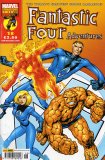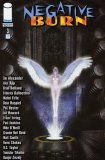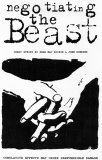Stripping Down #9

“Dysfunctional” by Mark Waid + Karl Kesel
& Paco Medina (Fantastic Four (v1) #514-515)
“A Skrull Walks Among Us!” by Stan Lee & Jack Kirby (Fantastic Four (v1) #18)
The Wizard forms (yet another) variation of The Frightful Four in (yet another) bid to defeat Reed Richards’ currently down-on-their-luck heroic quartet. Following a year of pretty heavy storylines, culminating in the Fantastic Four meeting God (as played by Jack Kirby), we’re back into more familiar territory with Dysfunctional. Waid and Kesel’s script introduces an intriguing pair of femme fatales in Salamandra and Cole, respectively the ex-wife and daughter of the aforementioned Wizard. However, a couple of narrative points niggle: I’m not entirely convinced by the Wizard’s casual dispatch of long-time compatriot The Trapster. Also, the omission of fellow founding member The Sandman seems odd, given The Wizard’s ‘rehabilitation’ of the character in The Astonishing Spider-Man a while back. Then again, the latter’s current whereabouts could well have been explained in another title that hasn’t seen the light of day on this side of the pond. Whilst stretched (no pun intended) rather thinly over two issues, with at least one more to follow, Dysfunctional is an enjoyable old school Fantastic Four story, combining humour and drama. Paco Medina’s art is strongly reminiscent of series regular Mike Wieringo, though crosses the line into overtly cartoony that the latter more expertly treads. Stan Lee and Jack Kirby’s regular archive feature spotlights the debut of the Super Skrull. Not one of their finest stories, it nevertheless contains some memorable moments, not least the opening sequence showing the FF sitting in front of the TV before Reed and Sue head off for a swim. Municipal pool by car? Nah, Hawaii by ICBM, of course! Priceless.
Panini UK comics website.
2000AD Extreme Edition #18 (Rebellion)

“Shako!” by Pat Mills + John Wagner
& various (2000AD #20-35)
“The Shop That Sold Everything!” by Grant Morrison & John Stokes (2000AD #477)
“Project Overkill” by Kelvin Gosnell & Ian Gibson + Jesus Redondo (2000AD #119-126)
The concept of cover feature Shako – (stupid) man versus (smart) beast – is familiar. In this case, the eponymous character is an omnivorous polar bear who inadvertently swallows a canister of experimental nerve gas after a US plane is downed in the Arctic Circle. Cue a succession of predominantly sadistic, gung-ho Americans who attempt to kill Shako, but ultimately are fodder for a slew of inventive deaths. Over sixteen episodes, even Mills and Wagner struggle to avoid repetition, not helped by a constantly changing rota of Spanish artists that vary wildly in quality. Half-hearted morale aside, Shako provides some mindless entertainment for an hour or so. Project Overkill, another early series, follows a similarly well-worn path, that of the lone hero taking on a sinister government agency. The art, by Ian Gibson and Jesus Redondo, is much more consistent and coherent than Shako, as you might expect. However, after a slow build, Kelvin Gosnell’s story comes to an abrupt, albeit conclusive, end after eight episodes. It’s difficult to judge if Project Overkill was a deliberate filler, or was curtailed after failing to engage 2000AD readers. However, the sense that the series feels truncated means that it doesn’t really make a lasting impression as a consequence. Finally Tharg’s Future Shocks, sandwiched between the two main features, is thematically speaking somewhat incongruous, but the involvement of Grant Morrison and John Stokes is enough to justify it’s inclusion.
2000AD website – Extreme Edition page.
Negative Burn #3 (Image/Desperado)

by various
A striking cover by Tomislav Tikulin fronts the latest issue of this black-and-white anthology which, despite the involvement of a major publisher and several well-known professionals, retains a pleasingly small-press feel. The Stone Devil, the first of eleven (count ‘em, eleven) features, is a marvellous Faustian tale with deft scripting by Phil Hester and suitably bleak art by Federico Dallocchio. Danijel Zezlj’s El Angel Exterminador offers a striking visuals but is let down by a narrative that somehow manages to be clichéd, superficial and obtuse all at once. Similarly, 9/11 story Breaking Up is a disappointment, with Paul Jenkins delivering an unusually stilted monologue and Kevin Stokes’ cartoony style sitting rather uncomfortably with the story’s tone and subject matter. Like Danijel Zezlj’s contribution, The Empty Canvas by R.G. Taylor is a case of style over substance. His insight into the artistic process looks great, but I felt that the strip had little more to say, in literal and expressive terms, and consequently is rather forgettable. Whilst stuck in critical mode, I’ll fire off a final salvo at Graeme Neil Reid’s 3rd Time Lucky?. It’s a well executed piece, but suffers from an over familiar theme and, as the closing comic strip, means that the anthology ends on a rather flat note. Happily, Negative Burn #3 has considerably more pros than cons. Brian Bolland contributes an amusing Mr. Mamoulian skit on daydreaming, whilst Frazer Irving allows a peek at seven pages of extracts from his Sketchbook, which is a delight, whilst only hinting at the range and breadth of this talented creator. I’m unfamiliar with who – or what – Matthew Smith’s Fade is but Signs & Wonders 1: Legacies, the issue's sole serial, offers an intriguing opening instalment with sketchy yet atmospheric line work. Rivalling The Stone Devil as my favourites this issue are a trio of very different tales. Mike O’Neill and Alex Apps produce a hilarious cautionary tale about accepting a Free Lunch from ninjas. Superhero satire Broken is another winner, with a smart idea by Dean Haspiel wonderfully realised by Michel Fiffe’s detailed art. However, Jim Alexander and Jon Haward’s Conjoined Sins, featuring their gumshoe detective creation Sideburns, is perhaps The Stone Devil’s most serious competition for best comic strip. If you’ve read my previous Stripping Down reviews, you’ll know that I’ve highly rated their previous superhero material. Rest assured, Jim Alexander’s smartly scripted tale of betrayal and deceit doesn’t disappoint, with strong dialogue and characters. Seemingly shot directly from detailed pencil art, there’s an edgy quality to Jon Haward’s visuals that arguably ranks it as one of his finest pieces of work to date. As a fellow bearer of mutton chops, I can only call for more Sideburns, please. Anthologies can be a bit hit and miss, but there’s plenty in Negative Burn #3 to make it a worthwhile investment of your time and money.
Desperado Publishing - Negative Burn page.
Negotiating The Beast (Downright Bockedy)

by Sean Mac Roibin & John Robbins
A welcome collection of previously published work, comprising a single text piece, an introduction-cum-obituary for Mac Roibin by his artistic foil (alter ego) John Robbins, and twenty one-page stories. Essentially a hybrid of prose and comic strip, neither medium is compromised. Nor for that matter is the narrative focus; the cover (perhaps wisely) warns that “cumulative effects may cause irreversible damage”. Broadly speaking, Negotiating The Beast not only examines the underbelly of humanity, but slits it open and extracts the contents. Whether conveyed in the first- or third-person, there is a detachment to the writing that lends the humorous pieces a discomfiting quality and makes the frequently unsettling scenarios even more provocative. There are literary comparisons – Will Self, Ian McEwan and Derek Raymond immediately spring to mind – but Mac Roibin’s writing offers an intensely individual and incredibly consistent vision. Likewise, John Robbin’s art is versatile enough to realise – and frequently heighten – the atmosphere of the stories. The darker narratives are brought to life through expressionistic brush and ink work, juxtaposing with detailed cartoon line work on the overtly comical or purportedly autobiographical tales. Of the latter, Blob’s Basketry and The Waiting Room are of particular note. At the other extreme, A Delay In The Evil Registering and Something In The Way deliver two of the most chilling narratives that I’ve read in any comic, with crap-inducing final panels that linger disturbingly in the mind. Negotiating The Beast is never an easy or comfortable read, which is exactly what makes it an essential purchase.
Sean Mac Roibin & John Robbins’ website.








